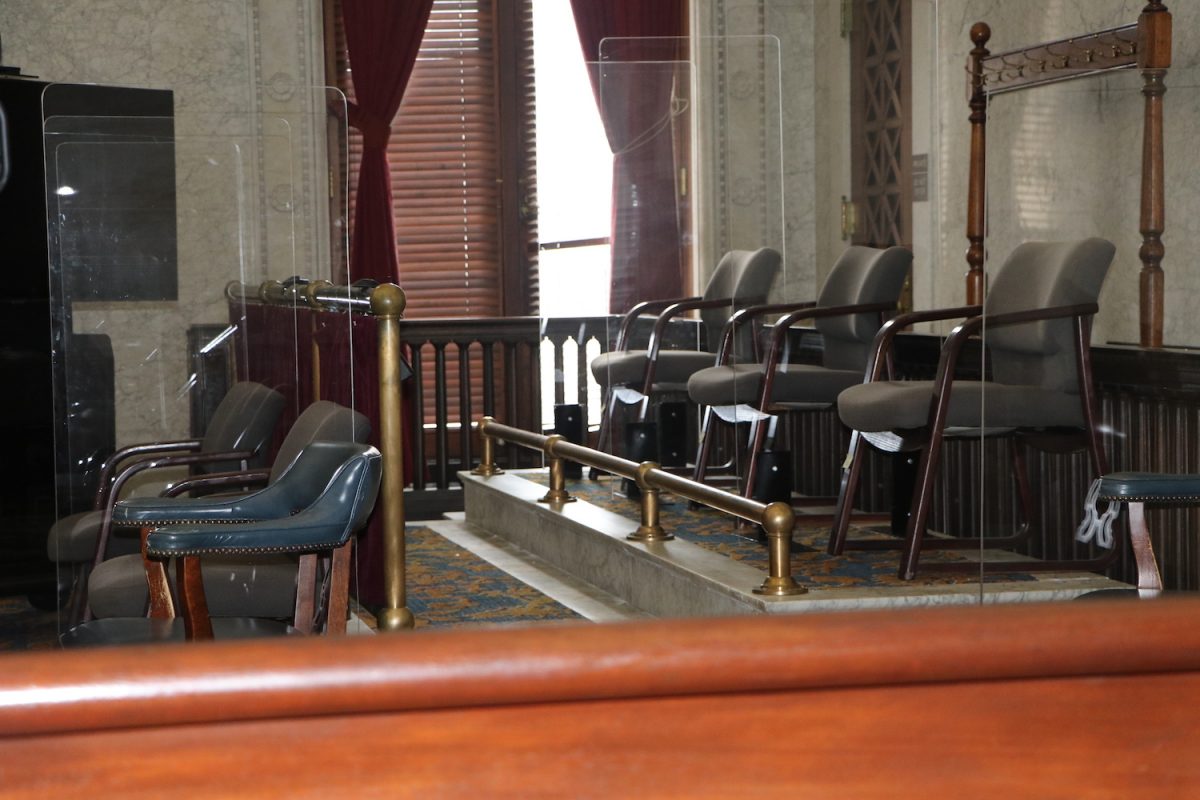
Thank you for reading Baltimore Witness.
Consider making a donation to help us continue our mission.
By
Connor Driscoll [former]
- August 12, 2021
Court
|
Daily Stories
|
Homicides
|
Shooting
|
Suspects
|
Victims
|
The prosecution in a trial on Aug. 11 argued that text messages and cell phone location data show that the defendant allegedly orchestrated the ambush-killing of a 26-year-old victim last May. However, defense counsel called the case a “house of cards made of circumstantial evidence,” citing a lack of eyewitness identification and physical forensic evidence.
During opening arguments, the prosecution portrayed the homicide as a “breach of trust” between Clifford Knight and the victim, Ronald Lewis. According to the prosecutor, data obtained through an FBI analysis placed Knight, 24, at the scene of the crime when it happened.
According to witness testimony, a distressed woman flagged down a Baltimore Police Department officer, stationed at the University of Maryland, around midnight on May 14, 2020. She alerted him to a shooting that had just occurred across the street from the University of Maryland School of Pharmacy.
At the scene of the crime located on the 100 block of Violet Hill White Way, the officer found an unresponsive man with two gunshot wounds, including one to the head. The man was pronounced dead about 40 minutes later at University of Maryland’s Shock Trauma Center.
Just six hours after the shooting, Knight cancelled the account associated with that phone number. However, Knight’s defense attorney, Robert Cole Jr., countered that the “cell site” analysis was “absolutely not a full-proof science.” Additionally, there is no evidence that Knight was in possession of the phone at the time of the homicide, Cole said.
“We may not know who pulled the trigger,” the prosecutor said. However, the prosecution argued that planning or, in someway, orchestrating a murder should be treated “exactly the same” as pulling the trigger.
In the days following the homicide, Baltimore Police Department investigators found text messages and call records on Lewis’ cell phone indicating that the last person the victim spoke to was a person under the contact name “Cliff Cuz.” Records from the cell phone provider showed the number associated with “Cliff Cuz” was registered under Knight’s mother.
The texts revealed that Knight had recently texted Lewis complaining that he had sold him fake drugs. Both the prosecution and defense said Lewis was a prolific drug dealer. That evening, Knight then set up a meeting with Lewis. Knight’s last cell phone call to Lewis occurred about 15 minutes before the shooting.
Prosecutors allege that the “meeting” was in fact an ambush. When a black sedan pulled up to the meeting site, Lewis got out of his car to talk to the people inside of the vehicle. A witness testified that, a few minutes later, gunshots rang out and the car sped off.
Two shell casings found at the scene, along with the two bullets recovered from Lewis’ body, matched a gun that was found during the arrest of a 26-year-old man two weeks after the shooting. He has not been charged in connection to Lewis’ death.
The trial was adjourned after an objection from the defense regarding the admission of certain Instagram photos of Knight. Cole pointed out that the prosecution failed to get copies of the photos certified by Instagram, conflicting with an appellate court ruling that raised the standard of authentication of social media posts.
Following oral arguments, Baltimore City Circuit Court Judge Martin P. Welch sustained the objection.
Before the trial began, Judge Welch granted the prosecution’s motion from Tuesday to exclude the lead detective from sequestration. That detective, a 20-year veteran, gave part of his testimony to the court on Wednesday.
In addition to the detective, a witness to the shooting, the crime scene technician, the police department phone analyst, a forensic firearm expert, and the first officer on the scene also testified.
The detective is set to return on Aug. 12 to finish the rest of his testimony. Afterward, the state plans to call more witnesses in the trial, which is expected to conclude on Aug. 13.
In connection to Lewis’ homicide, Knight is charged with first-degree murder, firearm use in a violent crime, having a loaded handgun in his vehicle, possession of a loaded handgun on his person, and felon in possession of a firearm. If convicted of the charges, he could face up to life in prison.
